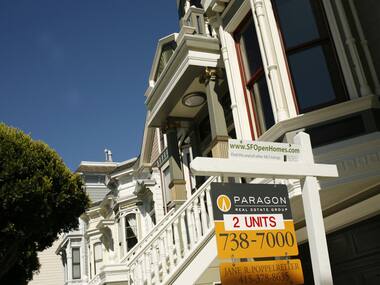San Francisco: Jake Harris, 37, is a primary-school teacher and for many years he lived near to the school where he works in San Francisco’s Mission District. But when his landlord decided he wanted his apartment back, Jake and his wife had to look for a new abode - a mission impossible in San Francisco on a teacher’s salary. [caption id=“attachment_2505586” align=“alignleft” width=“380”]  House prices go through the roof/ Reuters[/caption] They ended up moving to Berkeley, on the other side of San Francisco Bay, to rent a one-bedroom flat - for 2,300 dollars monthly. Now Harris has to get up at 5.15am every morning for the 1-hour train journey to San Francisco. “I’m actually at an age where I should have got somewhere. You’ve been to university, had a career, but you’ve got nothing to show for it,” he says. Lita Blanc, president of a regional teachers union, says Harris’ case is no exception. “I hear every day of a teacher that’s moved away (from San Francisco). And the horrendous living costs are the number-one reason.” The average monthly rent for a one-bedroom apartment - meaning one bedroom, a living room, and a kitchen or kitchenette - is 3,530 dollars and has increased by almost 14 per cent within a year. That makes San Francisco more expensive than Manhattan. The average price for a city-centre, one-bedroom apartment in the east of the United States is 1,000 dollars. It’s not just teachers but also artists who are leaving San Francisco, the very people who once made the city famous for its alternative scene. “We did a survey,” says Kate Patterson from San Francisco Arts Commission. “Of the almost 600 local artists we interviewed, 70 per cent said they’d been driven out of their studio and/or their apartment.” They’re moving out to the East Bay, or even further afield to the cities of Oakland and Los Angeles. In their place, software developers, social media strategists and data experts are arriving in droves, a change in people type which is also changing the city’s atmosphere. As some say, the “tech people” might earn a lot, but they don’t drink much, all wear the same T-shirt and even keep working at night. Art and music seem dead now in this city. Once the capital of Flower Power, San Francisco now threatens to become a dormitory town for people who work for the internet and tech companies in Silicon Valley, to the south of the San Francisco Bay Area, but who prefer to live in the city. And companies are doing everything they can to make the commute easier. Facebook, Google, Apple and others pay for buses equipped with WLAN to drive their employees the hour-long journey to Silicon Valley and back. Around 35,000 tech workers are thought to commute this way; Peter Vogt was one of them. He has worked for the internet auction site Ebay and the credit card firm Visa while living with his partner in San Francisco. In 2011, back when the area was full of empty warehouses, they bought an apartment in the Soma (South of Market Street) neighbourhood for 950,000 dollars. But then social media giant Twitter moved its headquarters there, as well as the online cork board Pinterest and the taxi service Uber. Since then the neighbourhood has boomed. Vogt, who’s just been offered a new job in the Spanish capital Madrid, now wants to sell his apartment and he’s asking for 1.7 million dollars - almost twice as much as when he bought it four years ago. “It’s obscene, I know,” he says. “But that’s how much our apartment has been valued at. And I’ve heard that lots of property goes at 30 per cent over the asking price and often it’s paid in cash.” San Francisco simply can’t keep up with demand for new housing. Five hundred million dollars have just been set aside by law to build 3,300 affordable apartments, but there are several problems with building any new housing. The city is surrounded on three sides by water and because of earthquake security measures, most buildings can’t be built above a certain height. That means it can’t continue to grow out in the way that other cities such as New York have done. Television station CBS recently ran an undercover report about a hostel in which a bunk bed in a four-person room cost 1,800 dollars a month, with a minimum 30-night stay - found over the online accommodation site Airbnb. Previously the city had seemed blind to these arrangements, but now authorities reckon that around 15 per cent of all empty houses and apartments have disappeared from the official rent market and reappeared on Airbnb. That’s caused a lot of anger in San Francisco, which culminated in a ballot to force Airbnb owners to register themselves with authorities which was voted on aside local elections this month. Though Proposition F was ultimately defeated, it was a sign of how high tensions are now running in the city. DPA Features
Once the capital of Flower Power, San Francisco now threatens to become a dormitory town for people who work for the internet and tech companies in Silicon Valley, to the south of the San Francisco Bay Area, but who prefer to live in the city.
Advertisement
End of Article
Written by FP Archives
see more


)

)
)
)
)
)
)
)
)



